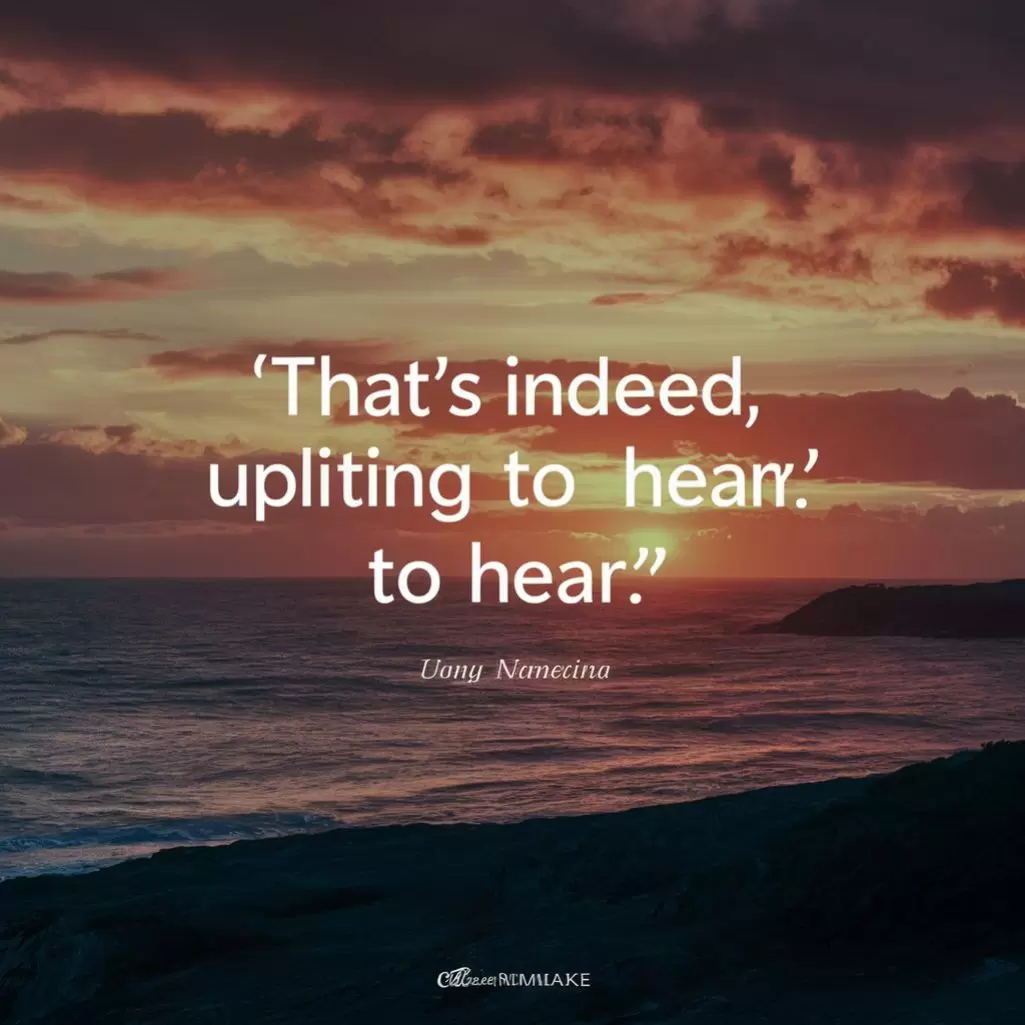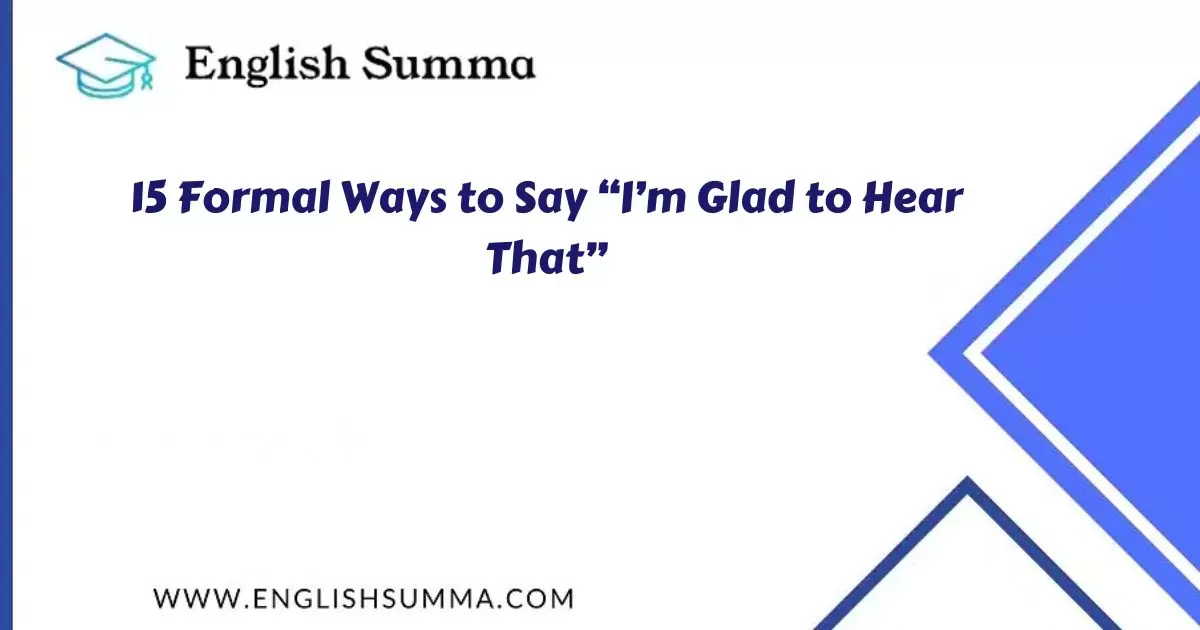Mastering formal expressions in professional communication fosters positive rapport and cultivates a respectful work environment. With sincerity and discernment, individuals can convey appreciation and gratitude effectively.
Expressing delight and gratitude appropriately is essential in formal communication. Whether it’s receiving positive news or acknowledging someone’s update, conveying your pleasure in a professional manner enhances rapport and fosters positive relationships.
Below are 15 formal ways to articulate “I’m Glad to Hear That,” along with scenario examples for each.
1. I’m Delighted to Learn That
Scenario: Email Response
Dear Daniel,
I hope this email finds you well. I wanted to extend my sincere gratitude for your comprehensive report on the recent project progress. I’m delighted to learn that the client feedback has been overwhelmingly positive. Your dedication and attention to detail have truly made a difference in our team’s efforts. Thank you for keeping me updated, and please convey my appreciation to the rest of the team as well.
Warm regards,
Adam Evans
2. It’s Reassuring to Hear That

Scenario: Professional Meeting
During a project status update meeting, Daniel shares some promising developments regarding the new marketing campaign.
Adam nods thoughtfully, then smiles warmly. “Daniel, it’s reassuring to hear that the initial results are so promising. Your insights and efforts have definitely paid off, and it gives me confidence in our strategy moving forward.”
3. That’s Most Heartening News
Scenario: Department Announcement
In a company-wide email, Daniel announces that the recent budget cuts won’t affect the upcoming team-building retreat.
Adam replies to all, “Daniel, that’s most heartening news. Maintaining morale and team cohesion is crucial, especially during challenging times. Your leadership in ensuring this retreat proceeds as planned is greatly appreciated.”
Read More:
- Proper Ways to Sign a Letter on Behalf of Someone Else
- Other Ways to Say “Please Don’t Hesitate to Reach Out”
4. I’m Pleased to Hear Such Positive Feedback
Scenario: Client Correspondence
Dear Daniel,
Thank you for sharing the client’s glowing feedback on our recent presentation. I’m pleased to hear such positive feedback. It’s a testament to the hard work and dedication of our team. Please convey my appreciation to everyone involved.
Warm regards,
Adam Evans
5. It’s Gratifying to Know
Scenario: Quarterly Review Meeting
During a quarterly review meeting, Daniel highlights the significant increase in customer satisfaction ratings.
Adam nods approvingly. “Daniel, it’s gratifying to know that our efforts to improve customer experience are yielding tangible results. This positive feedback reinforces our commitment to excellence.”
6. I’m Thankful for That Update
Scenario: Project Update Call
During a conference call to discuss project milestones, Daniel provides an update on the successful completion of a critical phase.
“Daniel, I’m thankful for that update,” Adam remarks. “Your diligence and effective project management are evident in the smooth execution of this phase. Thank you for keeping us informed.”
7. That’s Indeed Uplifting to Hear

Scenario: Team Briefing
During a team briefing, Daniel shares news of an unexpected increase in sales figures.
Adam addresses the team, “Daniel, that’s indeed uplifting to hear. Your dedication to our sales strategies is clearly paying off. Let’s continue to capitalize on this momentum and strive for even greater success.”
8. I’m Appreciative of the Update
Scenario: Monthly Progress Report
Dear Daniel,
Thank you for providing the monthly progress report. I’m appreciative of the update. Your thoroughness and attention to detail are evident, and it helps us stay on track toward our goals.
Best regards,
Adam Evans
9. It’s Excellent to Receive Such News
Scenario: Internal Memo
Daniel circulates an internal memo announcing the successful completion of a challenging project milestone.
Adam replies to the memo thread, “Daniel, it’s excellent to receive such news. Your leadership and the team’s collective efforts have been instrumental in achieving this milestone. Let’s celebrate this achievement and continue striving for excellence.”
10. I’m Grateful for the Information
Scenario: Training Session Debrief
After a training session, Daniel shares key takeaways and insights with Adam.
“Daniel, I’m grateful for the information you’ve provided,” Adam remarks. “Your commitment to ongoing learning and development sets a positive example for the team. Thank you for sharing your knowledge.”
11. That’s Welcome News, Indeed
Scenario: Project Kickoff Meeting
During a project kickoff meeting, Daniel announces that the necessary funding has been secured.
Adam addresses the team, “Daniel, that’s welcome news, indeed. Securing funding is a crucial step toward project success, and it sets a positive tone for our upcoming efforts. Let’s proceed with confidence and determination.”
12. It’s Truly Satisfying to Hear That
Scenario: Performance Review Discussion
During a performance review discussion, Daniel shares positive feedback from a client regarding Adam’s leadership.
Adam smiles appreciatively. “Daniel, it’s truly satisfying to hear that our client values our partnership. Your ability to cultivate strong client relationships reflects positively on our team as a whole. Thank you for your efforts.”
13. I’m Encouraged by Your Update
Scenario: Team Check-In Meeting
During a team check-in meeting, Daniel provides an update on the progress of a challenging project.
“Daniel, I’m encouraged by your update,” Adam remarks. “Your resilience and determination in overcoming obstacles are commendable. Let’s continue to support each other as we work toward our goals.”
14. That’s a Relief to Know
Scenario: Crisis Management Meeting
During a crisis management meeting, Daniel shares that the potential supply chain disruption has been averted.
Adam exhales audibly. “Daniel, that’s a relief to know. Your quick thinking and decisive action have helped mitigate a significant risk to our operations. Thank you for your proactive approach to resolving this issue.”
15. I’m Glad to Be Informed of That
Scenario: Weekly Progress Update
Dear Daniel,
Thank you for the detailed update on the project’s progress. I’m glad to be informed of that. Your regular updates help me stay informed and make informed decisions. Keep up the excellent work.
Best regards,
Adam Evans
Pros and Cons of Formal Expressions
Pros:
- Enhances professionalism in communication.
- Fosters positive relationships.
- Conveys appreciation and gratitude effectively.
Cons:
- May come across as overly formal in certain contexts.
- Requires careful selection based on the recipient and situation.
- Can be time-consuming to craft appropriately.
Conclusion
In conclusion, mastering formal expressions of gratitude and delight is a valuable skill in professional communication. By employing these 15 formal ways to say “I’m Glad to Hear That,” individuals can convey appreciation, acknowledge positive news, and foster positive relationships in various professional scenarios.
Each expression offers a nuanced way to express gratitude or satisfaction, allowing individuals to tailor their responses to the specific context and relationship dynamics. Whether it’s acknowledging a colleague’s hard work, celebrating a team success, or expressing relief in challenging situations, choosing the right expression can enhance rapport and convey sincerity.
However, it’s essential to strike a balance between formality and authenticity. While formal expressions add professionalism to communication, overusing them or employing them inappropriately may come across as insincere or overly rigid. Therefore, individuals should consider the tone, context, and relationship dynamics when selecting the most appropriate expression.

Meet Steven Smith, the driving force behind “English Summa.” Armed with a Bachelor’s Degree in Linguistics and a passion for teaching, Steven is dedicated to unraveling language intricacies for eager minds. Join him on a journey of linguistic discovery through Language Odyssey—a space where education meets inspiration, and the beauty of language unfolds.

